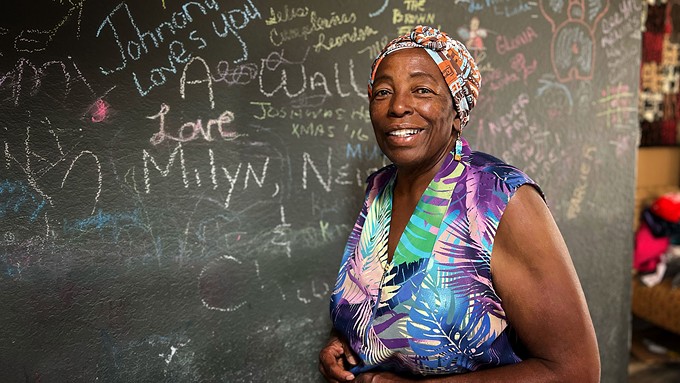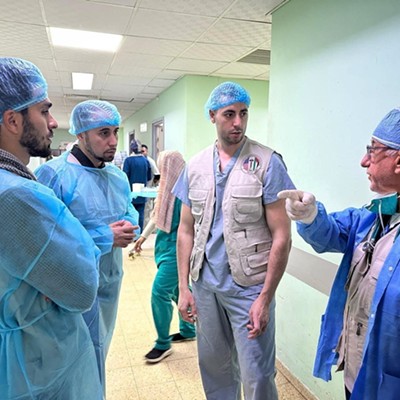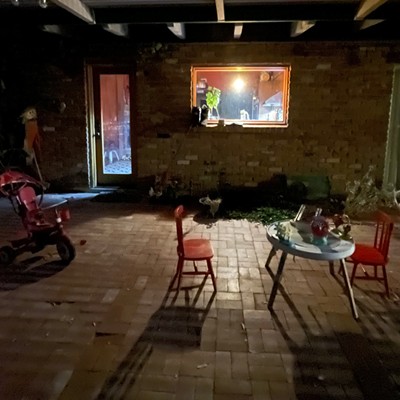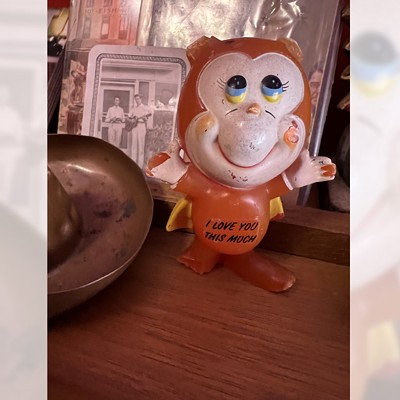
Grandma settles back into the dining room chair and the identical twin 5-year-old girls, Kiyah and Kiara, climb onto her lap, whisper requests into her ear. The girls are shy, giggle distractedly; there’s a stranger in the house. Respecting grandma’s gentle instructions to self-occupy, the girls slide from her lap and shuffle into their bedroom several feet away, their faces alight in coy, dutiful sweetness.
I’ve never met Leondra Price, aside from a single phone call, and she had me into her house. Sometimes you meet a person whose generosity of spirit makes them easy to reach, and she is. At the age of 73, Leondra is sturdy, younger than her years, with an expressive face that conveys a calm dignity, which completes her presence. She wears a colorful tribal headwrap, her nails are cared for and her laugh opens wide.
At a young age, Leandra was taught broadmindedness to push past the human shortcomings of others into acceptance, which, over the years, has become philosophical. She chooses a sanguine approach to humanity, because the universe hardly troubles itself with impartiality. She ought to know. She has made a career of helping others in quiet, overlooked ways, even starting a local “Living Library” — a human library to buck hatred, discrimination, stereotypes and prejudice.
Growing up outside Chicago in heavily segregated and redlined Evanston, Illinois, the daughter of a parks and recs custodian dad and a fulltime mother, she was the fourth born of six children. She didn’t know the family was poor. If she dreamed, it was hers. “One of my greatest gifts — I wanted a bike for my birthday, and it was on the front porch from my grandfather.”
She was influenced “by so many people. It’s really my family. Everybody in my family was committed to giving, serving and surviving. My aunts were amazing role models. My aunt was in her 80s still doing meals on wheels. My dad and his four brothers served in the military at the same time, in WWII. My grandmother and my aunt were activists. That’s the stuff I’m made of.”
She recalled teen familiars in words never stippled with resentment or anger; ‘Nam war protests, her racially divided schools, the Chicago riots, the 1968 Democratic National Convention protests, “In spite of that, it was a climate in which you could disagree politically — but you wouldn’t worry about getting shot!”
She drew on her personal history and experience to raise children, and now her grandchildren, in a neighborhood far from any ethnic enclave on Tucson’s far east side, all suburban tract beige, parks and bike paths. Inside, it is airy with wood floors throughout, clean and well-kept, alphabet charts and educational kids’ games mix with art on the walls, Cuban, South American and African masks, and hers is an eye for comfort, narrative and learning. “I would spend my last dollar on art,” she said. A chalk wall in the kitchen, on which visitors have signed their names and greetings, yet the lower half wiped often to accommodate Kiyah and Kiara’s endless expressions.
In the bedroom, the door is open and the air cracks with child merriment.
She is raising these two of her 10 grandchildren on her own, has been since their first hundred days of life in the hospital. Their mother Courtney, Leondra’s daughter, is in the army. “Because of Courtney’s unique military service, the kids are with me,” Leondra said.
The children were born at 24 weeks, barely a pound and a half each, could fit in the palm of your hand. Hence, disabilities, which require myriad doctors and medical-center visits. “Physical therapy, hearing, nasal reconstruction, speech pathologists, on and on,” she said, shrugging a laugh.
She relaxes into her nature and talks everything: philosophy, art, books, child-rearing, jazz, family, her dreams and tragedies. And of her five children, two are gone.
Leondra’s first son died at birth around 1980. “I heard him cry one time. He was born slightly premature. If he was born today, he’d be fine. He had underdeveloped lungs.” Soon her son, Matthew, was born.
Three years ago, her 26-year-old daughter Malika Monai Price jumped from the 34th floor of a Vegas hotel to her death. There is a long silence, Leondra’s eyes show a somber inward gaze, and she said, “She called for help, and no one came to help her.”
Malika left behind two children, now in the care of their fathers. Leondra shakes her head. “What’s unbelievable is driving down the street in Tucson and I get a call from the Las Vegas coroner.” That day, Leondra pulled the car over and received the news. The woman from the coroner’s office offered a prepared speech, which blurs in Leondra’s memory. She only remembers the message. She sat in her car for a while, reflecting on the tight bond between herself and her offspring. Finally, she mustered strength and phoned her other three children. One, Leondra swears, fainted on the other end of the line.
Malika had “left the kids with their dads,” traveled from Tucson to Las Vegas, “and that was it. She suffered post-partum depression, she was also in a relationship that was unhealthy. I’m saying that from the outside looking in, and maybe I’m speaking out of turn. She kept to herself. I know she loved someone who didn’t love her back. I could only see what I could see. As a parent, all I could really do was step back and watch.”
***
One day, in the late 1940s, before Leondra was born, her father Leon was pushed from a Chicago “L” train by a white guy because of his skin color. Leon pounded him, and assumed responsibility, waited for the cops to arrive to arrest him. In court, the victim accused Leon of using a hammer. Leon raised his arms to show the judge he used only his fists.
Leondra remembers her dad paying an additional fee to have his surname included on his work shirt, a privilege only for whites. Black employees were restricted to solely using their first names. “It was one step up from ‘boy,’” Leondra said. “They said, ‘so as a Black man, you want to be respected?’”
Leon was very proud with a strong work ethic. “Everyone called him ‘Mr. Price.’ He knew everyone and was loved. “Dad said, ‘Get a job, keep a job. And don’t take any crap while you’re there.’ I was named after him,” she laughs. “He had me under the hood of cars, under sinks. We knew how to do everything.”
What she remembers vividly are the head-swiveling names, the movers and shakers of black power, nonviolent action and civil disobedience who’d gather at her grandparent’s apartment in Chicago. Stokely Carmichael, a figurehead in the civil rights and global pan-African movements and Charles Hamilton, the man who jumpstarted desegregation in schools. Her aunt Sharon organized and hosted SNCC (Student Nonviolent Coordinating Committee), Core (Congress for Racial Equality) and NAACP meetings.
“Our house was a safe house,” Leondra said. “I’d come in to my grandparent’s house and Stokely would be sitting in my grandma’s chair! My grandmother Francis was raised in the south, she’d seen her share, saw things firsthand. She taught us about civil rights. She was an activist. My aunt Sharon didn’t fall far from my grandmother’s tree. It was part of our daily lives.”
She continues, “It was the UN at our grandparent’s dinner table. You never knew what language you were going to hear. I was blessed to be around people of such diverse backgrounds. There were Jewish people, gay people, Asian, even Navajo. I learned so much.”
She was reading at 4 years old, thanks to an older sister. Her uncle and older brother got her thinking large. She grew up on books and music, jazz and soul, cites Monk, Coltrane, Curtis Mayfield.
(The first music Kiyah and Kiara heard was jazz. They like pianists’ Keiko Matusi and saxophonist Pamela Williams, guitarist Peter White).
As a teen she’d get her kicks sneaking into Black clubs, where she’d be let in because she wouldn’t drink, there for the music only. She met Miles Davis.
At Chicago’s Kendall College, Leondra studied “being stupid. I had no focus.” She got hired as a bus driver, one of the first women in Chicago to do so, she commandeered a 40-foot local commuter from Des Plains to Downtown Chicago.
Leondra met and married her only husband, a white serviceman she met in Chicago, and the couple moved to Tucson for his stationing at Fort Huachuca. She adored Tucson and “it was also a way to get out.”
The mixed marriage troubled no one but her new in-laws, who didn’t support it, until they met their grandson, Matthew. “When I first came to the door my mother-in-law treated me like the Avon lady!” Leondra said the baby melted her father-in-law’s hard heart. “From that moment on he supported our marriage in every way.”
Her husband was a tragedy of ‘Nam, PTSD to alcoholism. It wasn’t easy. She told him, “You can’t keep taking us down this road.” They divorced and he died of cancer from agent orange in the ’90s.
The single mother fostered children, too, it was a houseful, similar to her childhood. “My great grandmother and my grandmother raised kids who were not their kids.”
She struggled and finally found solid work, made a 25-year career working for the city of Tucson, contributing to a greater good; human resources, housing, transportation and in the equal opportunities office as an investigator who dealt with discrimination daily. An aide for those in need.
“Oh, God,” she said. “In a way my job was kind of like being a dentist, nobody goes unless they are in pain. And they’re in pain — something is not right, they’ve been discriminated against for whatever reason, and they’re in a great deal of pain.”
She retired from the city with a pension. At one point through her work in the Office of Equal Opportunity, she spearheaded in Tucson something called Living Library, which has since changed its name to Human Library. It was her idea to host it in Tucson. She got to know the folks from Denmark who founded the organization, and they allowed her to be a “librarian.”
The participants are a human book, and you check one out to “read.” The “Librarian” oversees. Human “Dictionaries” serve as interpreters through sign language and foreign languages and interpretation.
“It’s really about having a conversation with someone who looks different, who sounds different, who lived a different life than you. Have you ever had conversation with a trans person? It’s about interactions with someone who is unique from you, facing fears.”
Her time now is motherhood. Her day begins at 5 a.m. Physical therapy for the girls, weights, stretching, working their ankles. Running them to appointments, “a lot since they’ve been in the world.” They ride two miles on a bike path, the twins on tricycles, Leondra on her road bike.
She loves dance, and slips away when she can. The Chicago two-step is her move. “But a babysitter costs me a fortune.”
Their teacher Terry George (disclosure: George is my stepsister), is an early childhood special education teacher in the Vail School District, who sees the twin girls four days a week for three hours each. She told me later, “As a parent or grandparent, Leondra is fierce. Kiyah and Kiara are both doing very well and that shows the work and love she puts into them.”
It is a couple days before Easter and eggs set for painting are centered on the dining room table before her. Religion rises in conversation, subjects on which she is learned. She is not beholden to any religion, scoffs at the idea. “I’m universal and inclusive,” she said, “and spiritual,” which, she deduces, really boils down to a few simple truths: “To open your heart, open your arms, never judge another person and do what you can to care.”
At one point she got ordained as a minister “but no church would have me,” she laughed. “No, Gabriel ain’t gonna be blowin’ a horn when I die.”
***
Leondra is an enthusiastic gardener, and her walled-in backyard is her sanctuary, the neighboring houses seem to recede from view. It is very pleasing on a cool day in Arizona. Myriad potted plants with all manner of flora, spices, and vegetables; the girls grow their own too, from chocolate mint to sweet pepper.
She plops into a porch chair, her grandchildren play on little pink trampolines on a slight grass stretch, and she said, “I consider them a gift.”
She added, “Young people are not taught to be critical thinkers. To analyze, tackle big ideas. We need that in our culture now.”
A few houses down, the rooster crows, an anomaly in this neighborhood.
Leondra talked of her siblings, all but one is now dead, and she was close with each. She’s keen to publish a book, a simple one of quotes, of wisdoms, culled from her siblings and extended family members, people she met through the years, quippy remembrances as a commendation and tribute of sorts, accompanied by a bio and photo of each contributor. She cited one: “‘You have to let people practice their charity,’ isn’t that great?”
She tied the quote into a larger context of personal disquiet. “It just hurts a lot. A lot. To know that someone thinks it’s their right to judge someone else’s truth, their life. Growing up in Evanston there was someone different at our dinner table at all times. Everyone deserves a place at the table.” She breathed a moment, adding, “When you know someone, it makes it harder to be unkind.”
Brian Smith's collection of essays and stories, Tucson Salvage: Tales and Recollections of La Frontera, based on this column, is available now worldwide on Eyewear Press UK. Buy the collection in Tucson at Antigone Books, 411 N. Fourth Ave. You can also pickup his collection of short stories, Spent Saints (Ridgeway Press).







